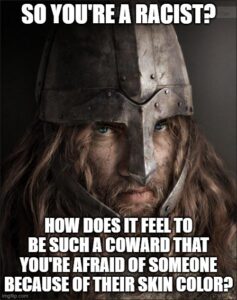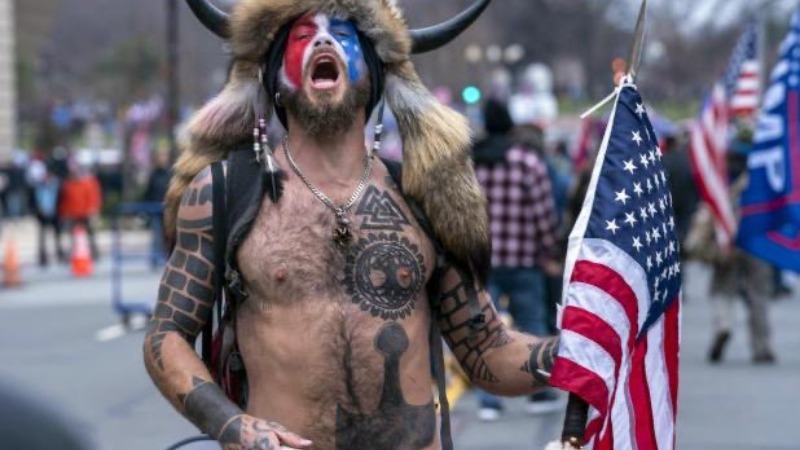In this post…
As a practicing Druid with a mainly Norse hearth culture, it breaks my heart to see my spiritual path polluted by racism. Many people are rediscovering the paths of our Norse ancestors, and are drawn to the rich lore, reverence for nature, and the empowering ideals found in tales of gods like Odin, Thor, and Freyja. However, this revival has also brought to light a significant and growing problem issue: the appropriation and distortion of Norse Paganism by people and groups espousing racist and bigoted ideologies, like the “QAnon Shaman” pictured above.
How Big Is the Problem?
A Troubling History of Appropriation
The association of Norse Paganism with racism is not new. Early 20th-century movements in Europe, particularly Nazi Germany, co-opted symbols like the runes and the hammer of Thor (Mjölnir) for nationalist and often racist propaganda. This misuse laid the groundwork for some modern extremist groups like fringe elements of MAGA to continue associating Norse Pagan symbols and practices with white supremacist ideologies.
Modern-Day Challenges
Today, racist factions within Norse Paganism are a minority but a vocal and visible one. Groups such as the Asatru Folk Assembly (AFA) have faced criticism for promoting exclusionary practices, explicitly stating that their spirituality is for people of “European descent.” This has sparked debates and concerns within the broader Pagan community.
Perception Issues
The association of Norse Pagan symbols with racism can discourage newcomers from exploring anything Norse as a viable spiritual path, fearing they can be aligned with hateful ideologies or at least be perceived to be. Even practitioners who actively denounce racism often find themselves needing to explain or defend their beliefs to the uninitiated. This is a major problem that Norse paths will have to address to experience any further growth in the future.
What Can Be Done About Racism in Norse Paganism?
The presence of racism in Norse Pagan paths is a pressing issue, but there are steps that the community and individuals can take to address it. While the list below isn’t all-inclusive, it offers a few places to start. It falls to those of use who follow Norse Paganism to call out the racists and bigots when they misappropriate our culture and our heritage.
1. Reclaim the Symbols

Symbols like the runes, Mjölnir, and the Valknut have deep, spiritual significance unrelated to racism. Practitioners can reclaim these symbols by educating others about their true meanings and using them in inclusive contexts. Publicly celebrating their importance as symbols of strength, wisdom, and interconnectedness can shift the narrative.
In Norse mythology, both Mjölnir and the Valknut symbolize key elements of divine power, protection, and the journey between life and death. Mjölnir, the hammer of Thor, the thunder god, is a potent symbol of strength and protection. It represents not only Thor’s ability to protect the gods and humanity from the chaotic forces of the giants but also the power to shape the world and uphold cosmic order. As a weapon that can both destroy and create, Mjölnir is often seen as a symbol of resilience, protection against evil, and the force of natural law. In Norse spirituality, it is frequently worn as an amulet to invoke Thor’s blessings for protection and strength. Note that it has never been used in the ancient sagas as a symbol of division, racism, or bigotry. Such things are modern inventions.
The Valknut, a symbol consisting of three interlocking triangles, is deeply connected to the realms of death and the afterlife, particularly the journey to Valhalla. The Valknut is often associated with Odin, the Allfather, who presides over the slain warriors in Valhalla, guiding them to the afterlife. Its representation of the connection between life, death, and rebirth points to the cyclical nature of existence. The interlocking triangles can be seen as symbolizing the interconnectedness of the physical, spiritual, and ancestral worlds. Again, the Valknut is a symbol of the cycle of life, and has nothing to do with racism or bigotry.
Together, Mjölnir and the Valknut evoke themes of protection, divine intervention, and the transition between worlds, offering both physical and spiritual strength for the living and those who have passed. This is true regardless of what race, gender, or sexual orientation the person is.
2. Promote Inclusivity
Many organizations and groups are actively working to make Norse Paganism more inclusive. For example, The Troth, a prominent Heathen organization, openly rejects racism and works to create an inclusive space for practitioners of all backgrounds. People can support and participate in such groups to amplify their efforts. You can also start your own group, or have events in which diversity is honored within the context of Norse Paganism.
3. Speak Out Against Hate
Silence allows racism to persist. When faced with racist rhetoric or actions within Norse Pagan circles, practitioners must speak out. This includes:
- Publicly condemning hate speech and exclusionary practices.
- Encouraging dialogue that educates and promotes understanding.
- Reporting extremist content or groups to relevant authorities or platforms.
- If you see something, say something…call out racism and bigotry on social media, in print, and at events whenever you see it.
4. Educate the Community
Education is a powerful tool in combating ignorance and bigotry. Hosting workshops, writing articles, or holding discussions about the history and modern implications of racism in Norse Paganism can help build awareness. This also involves teaching the authentic history of Norse culture, which was not exclusively “white” but had interactions with various cultures through trade and migration, and even through intermarriage. In fact, a recent study demonstrated that Vikings’ genetic diversity was greater in the past than in present-day Scandinavia, meaning that the Vikings were more of a culture and a language group than a race.
5. Foster Allyship
Building alliances with other Pagan and interfaith groups can strengthen the fight against racism. Collaboration can help highlight the shared values of spirituality, community, and justice that transcend individual traditions.
Rethinking the Foundations of Norse Paganism
It’s essential to recognize that Norse Paganism, like all spiritual paths, is rooted in principles of community, respect, and honor. These values are inherently incompatible with racism. Ancient Norse societies, though not perfect by modern standards, were far more complex and interconnected than the simplistic racial narratives used by modern extremists and racists.
Embracing Diversity
One of the most powerful ways to counter racism in Norse Paganism is to celebrate diversity within the spiritual path. Practitioners of all ethnic backgrounds have found meaning and connection in the myths and practices of the Norse gods. Highlighting these diverse voices challenges the notion that Norse Paganism belongs to one group.
Honoring the Ancestors Without Exclusion
Many practitioners feel a deep connection to their ancestors. Honoring one’s heritage can be a beautiful aspect of spirituality, but it must not be used as a justification for excluding or demeaning others. Ancestors from many traditions valued virtues like hospitality and fairness, which can guide modern practitioners. Norse Paganism is no exception. Introducing racism and white supremacy into Norse Paganism not only dishonors the person engaged in such practices, it also dishonors our ancestors as well and displays a total lack of character, courage, or decency.
Conclusion
Racism in Norse Pagan spiritual paths is a significant but not insurmountable problem. By reclaiming symbols, promoting inclusivity, speaking out against hate, and promoting education, our community can work to dismantle the harmful associations that have plagued this faith. Norse Paganism offers a spiritual framework that celebrates resilience, wisdom, and connection — values that are universal and inclusive.
The fight against racism in Norse Paganism is not just about preserving the practice’s integrity; it’s about ensuring that spirituality remains a force for unity and understanding in an increasingly divided world.
Share Your Thoughts on Racism in the Norse Community!
Have you experienced racism in the Norse community? Have you been a victim of racism in the Norse community? Share your thoughts in the comments below!
